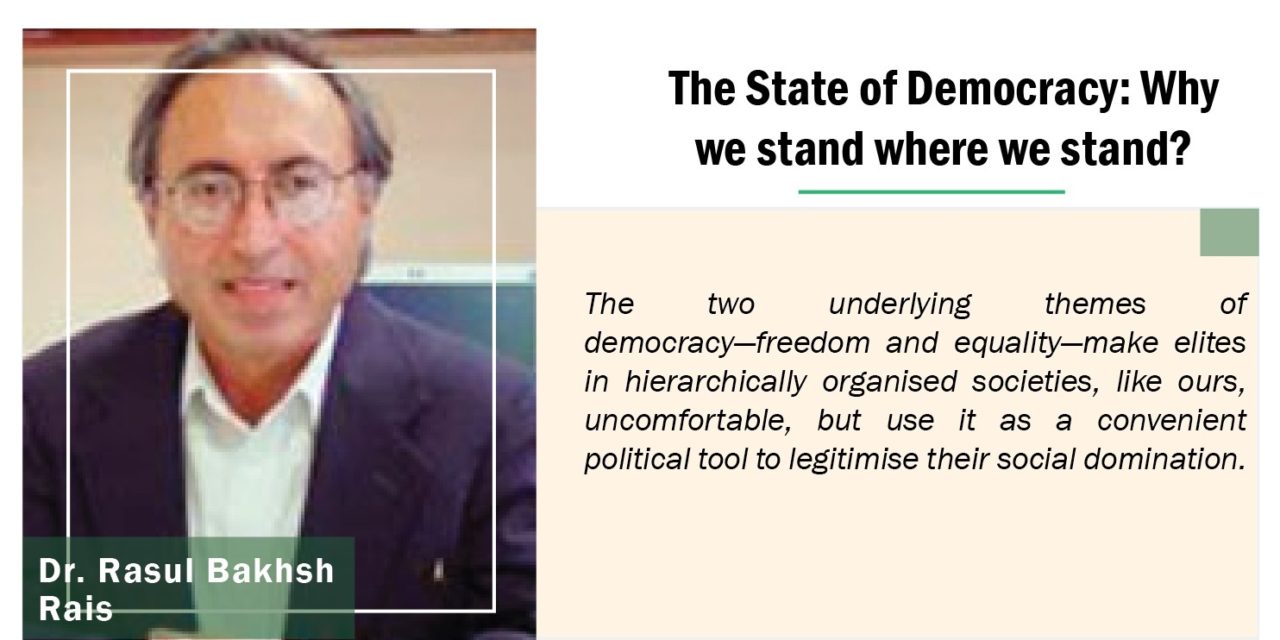Let me begin by making a few things plain about ethos, values, spirit and the foundational ideas that define modern day democracy. In everything it represents and stands for, the man, the people, the community and society have the right to rule themselves—to be sovereign. The government thus formed will exercise borrowed authority, and do so, and as long as, it can serve the public interest. Any failure would lead to recall of the government through peaceful means, which is done by holding elections periodically. Arguing that people have right of self-rule was revolutionary in the age of kings, but even in modern day societies the dominant social and political classes don’t easily accept it. The two underlying themes of democracy—freedom and equality—make elites in hierarchically organised societies, like ours, uncomfortable, but use it as a convenient political tool to legitimise their social domination.
This idea of democratic rule has a long history of flowering and a big struggle, countless sacrifices, bloody and peaceful revolutions and intellectual rigour behind it before it got recognised. It was not easy to achieve the objective of man’s rule because it would change the rules of the power game; the old classes would never give up without a fight, and delay its true manifestation as long as they could. Never was, or ever has this epic political battle confined to Europe and the lands where the seeds of democratic thought germinated first. In the post-colonial world, where the traditional elites and authoritarian state structures became to dominate national life, democratic ideas and voices got suffocated and even subjected to repression. Ironically, the national freedom movements were premised on the freedom of man, and the self-rule was actually a promise for the dawn of new democratic era. In Pakistan and many other states, the logic of state and nation building was used as a ruse to deflect demands for wider and deeper democratic representation. It was argued that economy, social stability and order and other pre-requisites of democracy have to be addressed first before democracy, as understood and practiced in the western world is to be embraced. The idea of ‘national security’ further added two more complications; the rise of the military as a powerful institution, and the semi-authoritarian state under its shadow with a façade of ‘controlled’ or ‘guided’ democracy.
Actually, growth and development of democracy in Pakistan got arrested with the lengthening of shadow of the military rule and four disruptive interventions. Every time, civilian elites, had to pick up the pieces and rebuild parliamentary democracy with troublesome lingering political, institutional and constitutional legacies. Some of these inheritances in the form of fragmented parties, political opportunism, dynastic political parties, horse-trading and electoral manipulations continue to retard quality of democracy in Pakistan. My argument is that we cannot understand the current state of democracy in Pakistan without reflecting on structural constraints and institutional roadblocks that were erected to tame the free democratic spirit. Losing this spirit, democracy only in form would be soulless, and it has been during the military regimes and after every transition to civilian rule. It goes to the credit of democratic political parties that they have showed remarkable consensus on restoring parliamentary spirit of the Constitution and purging it of semi-presidential amendments. However, mere path-correction couldn’t be enough, though very essential to resume the democratic journey. The real challenge was, and has been how to establish ‘civilian supremacy—the true power of a representative government.
Democratic transitions are problematic, but more so in post-military regimes. Each case is unique but much would depend on the quality of democratic culture, institutional balance, the residual power of the military elites and the performance legitimacy of the civilian leaders. We have ample evidence from such transitions in Latin American countries and from Pakistan’s history to suggest performance in power is the key to correct the institutional balance in favour of the elected governments. We know how hard it is to sink roots of democratic culture in tribal, traditional societies like ours. The agency to doing so is good governance, rule of law, neutral and efficient justice system. This is how relations between states and societies have got transformed to the advantage of both: state serves and the society gives legitimacy and support. If the quality of democracy remains low, the reasons must be understood, as Pakistan remains deficient in values that would make it better.
Pakistan at best remains a formal democracy, weak, and it may be termed as a ‘bad’ democracy, an expression I am hesitant to use. It is better to have this democracy than entertaining any illusion of ‘good’ military rule. Democracy is an evolutionary system, it grow by practice. Consistency and time are two important variables. There are good signs of progress in the third democratic transition that we are witnessing. Three peaceful democratic transitions have taken place; each time a different political party has formed government at the centre. Each of the last two parliaments completed their five-years tenure, and the prospects for the third remain optimistic.
In my view some of the social preconditions of democracy are encouraging. I see a great hopeful sign in the emergence of a big middle class both in the urban and rural areas of the country. It means individual autonomy, breaking down of the traditional political alignments and greater value for performance in making choices at the time of elections. There is remarkable growth of urbanisation in Pakistan. Wherever it has happened, it has changed the dynamics of local and national politics. The proliferation of media platforms and growth of civil society are positive developments, as they empower people by giving them a voice.
The progress of democracy is slow, and may remain so for elitism—exclusivity of political dynasties—role of ‘invisible’ hands and abysmally low level of civic engagement. The politics has yet to rise above personalised conflicts to issue-based collective engagement, and above all, freedom and equality become social and cultural values.


